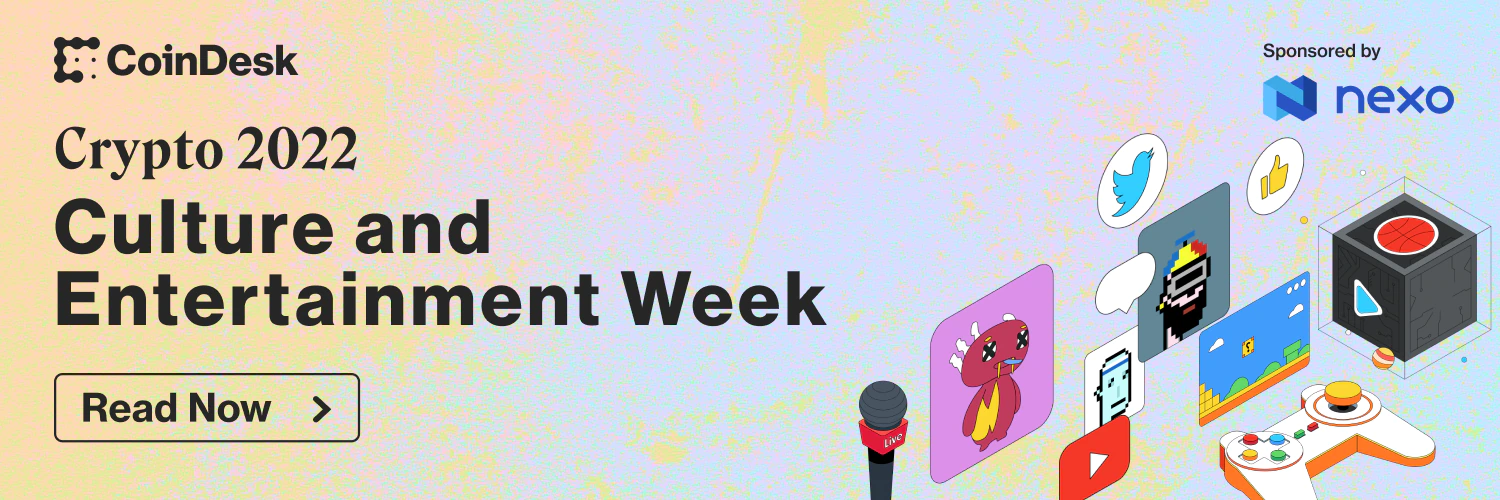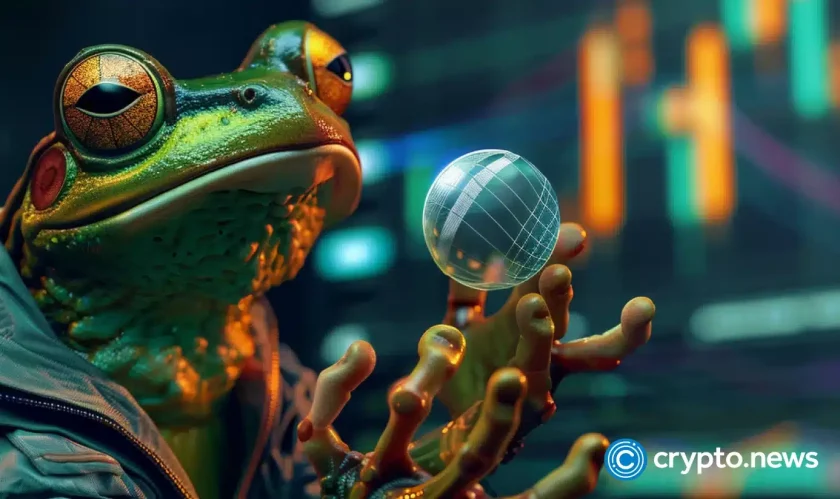Neil Strauss knows how to write about weird subcultures. His infamous bestseller “The Game: Penetrating the Secret Society of Pickup Artists,” released in 2005, introduced the world to concepts like “negging” and “peacocking.” (If you ever set foot in a club in the 2000s, you’ve heard the terms.)
More bestsellers would follow. Ten in total. Books on survivalism, heavy metal, porn stars. But Strauss might have just stumbled into the wildest subculture of his career: The Bored Ape Yacht Club. (In the unlikely event you clicked on this story but are unfamiliar with the BAYC, you’ll find a quick primer in my conversation with its anonymous creators.)
This interview is part of Culture Week, which explores how crypto is changing media and entertainment.
So how is Strauss involved with the Bored Apes? It started with Ape #1798. This would be an Ape that goes by Jenkins, or rather “Jenkins the Valet.” The owner of Jenkins, in a legitimately inspired burst of creativity, invented an elaborate backstory for his Ape. Jenkins (the Ape) comes from humble roots, and now he works as a valet for the Yacht Club. Jenkins is always listening. Jenkins knows the Club’s juiciest secrets. Now Jenkins is ready to write a tell-all memoir about the Apes’ shenanigans.
And Jenkins will have help. During the real-life mayhem of NFT NYC, as Jessica Klein reported for Input, one of the Apes (or technically a human who owns an Ape) told the ecstatic crowd, “We needed to find the best memoir writer that ever existed … So, we found Neil Strauss.” The Apes cheered.
Now, this is where things get interesting. What, exactly, does it mean to write a “memoir” about a group of NFT avatars that kind of exists but kind of doesn’t? “That’s up to the community,” Strauss tells me. And this is literally the case. Through a clever use of NFTs within the BAYC ecosystem, the Apes can purchase the right to enter the “Writers Room 2.0″ – essentially a group conference call with Strauss. If you’re an Ape who splurges on a top-tier “yacht” NFT, then you get to be an actual character in the book. Your Writers Room NFT also gives you voting privileges, letting you help shape the narrative of the book.
It’s easy to be cynical about a book of fake apes. And it’s easy to dismiss all of this as crypto speculation run amuck. Then again, for years, blockchain advocates have championed its ability to “disrupt industries.” That’s usually an abstract concept. That’s usually all hype. But here is a concrete, hyper-specific example of a group of creative people who are using NFTs – and the wealth they generated through said NFTs – to recruit a blue-chip, bestselling writer to conjure a book into the world. Yes, the book will be about “fake apes,” but isn’t that just a form of fiction? Perhaps this will be the first true novel of Web 3.
Oh, and Jenkins the Valet? He is now repped by Creative Artists Agency. “Yes, that CAA,” writes Jenkins (the human owner) on his site. “The same one that represents Justin Bieber, Beyonce, Dwyane Wade, Cristiano Ronaldo, Brad Pitt, and Tom Cruise. They now also represent me, Jenkins The Valet, on my content endeavors.”
In the meantime, Strauss has been a busy guy. On Dec. 5, he became the first mainstream author (at least that we’re aware of) to mint a book on Ethereum and sell it on OpenSea:
“Surviving All Apocalypses: From Machine Uprisings to Bear Markets.” Only 892 copies were minted, and as of this writing, the “floor price” of the book is 0.59 ETH, or roughly $2,600, meaning the implied market cap is over $2.3 million. Has Strauss just cracked the future of publishing?
Strauss has long been fascinated by crypto and the NFT space. He’s been curious as to how, as a creator, he can make the most of this new world. He’s been asking himself, “What is the place for an author there?”
Now he has his answer.
Interview has been condensed and lightly edited for clarity.
CoinDesk: How’d you get involved in this wacky world?
Neil Strauss: Back in 2016 I heard about Steemit. I thought, “That’s a cool model; you can get paid in crypto instead of likes.” And that really makes more sense. Because who cares about a heart emoji?
Right.
So I put something up and it made $7,500, or something crazy like that. And I’m like, this is really interesting. I then thought, “Let me do a test.” So I wrote a piece for Rolling Stone about Steemit, and then I wrote a piece on Steemit about writing the “Rolling Stone” piece. I wanted to see which performed better. And in terms of attention, interest and on a monetary level, the one on Steemit far outperformed the one on Rolling Stone.
Clever double-dip, sir. Well played.
Yeah, exactly. [Both laugh.] And this was before Substack. Then I realized, ok, this is the way, as a creator, for me to access this new asset class without a financial investment. It’s a time and creativity investment, which is how I’ve navigated the world so far.
When did you get into NFTs?
Last year was the year of DeFi. And at the end of last year, we all knew that this year would be the year of the NFT. And I got excited again. It was like Steemit all over again. So I thought, “Now this could be a place for me as a creative.”
How did Bored Apes enter the picture?
It’s so interesting, because so much of the NFT space started off on Clubhouse. If you went to NFT NYC, you’re almost not sure if this is a Clubhouse convention or an NFT convention. They’re inseparable. [In Clubhouse, I met] GMoney, who was one of the first people to really put down a lot on a CryptoPunk. Do you know GMoney?
Yeah, he had a Twitter thread explaining how buying the CryptoPunk was like buying a Rolex, and how it’s a signal to the community.
Right. So [in Clubhouse], GMoney was promoting that NFTs are the new status game. In the same way you get a Rolex you get a CryptoPunk. And I’ve been working through, what is the place for an author in the NFT space? GMoney said, “You should meet Jenkins.” And he made an introduction.
What excited you about the idea?
I loved what they were doing. This is something that feels new. There are like 18 ideas layered into it, but for one, the idea that this IP of an ape is worth more than flipping it for the market value of the ape. The idea that this is an IP play. That I’m going to create this other NFT, and that’s going to allow people to let their apes participate in different ways in the book, and for their owners to take part of the creative process. How cool is this going to be, to create as a community?
Dumb question, but can you tell me what the book is? How much of it is fictional? How much are you filling in the blanks with your own imagination and creativity? How much of it is the Apes’ imaginary exploits? Or are you writing about the actual people who own the apes? There are so many ways this book can exist. What’s the format?
That’s a great question. I love these questions. It’s so fun because you can’t really have these conversations with your friends. Because they just don’t get it. You just end up explaining why someone would pay that much for an Ape.
Oh, forget that! We’re way past that, we’re good.
No, I love that. I appreciate having this conversation. And it’s a great question. So as for what this book is? The answer is, that’s up to the community. However, the conceit that we’re starting with is that Jenkins the Valet has worked at the Yacht Club, and collected the secrets of some of the most rich and powerful apes in the world.
And he’s decided to approach the famous celebrity memoirist, you know, Neil Strauss, who’s also a character in this world, to do his tell-all book.
I’m envious, man. As a writer, I’m envious of this raw material.
It’s so fun. We did a first Town Hall talking about it, and we slipped into character. I played the memoirist, he played Jenkins, and people jumped on the call as their Apes and just started riffing. I’m recording it all, and that will all be raw material for the book.
Then more recently, they sent out little character forms, and I’m going to do a call later where I help the Ape owners with their storytelling, and with the background for their Apes. And building the story and the world around their Apes.
What’s the format of this Town Hall?
It’s on Discord. The Town Hall is really just a meeting of the holders.
Can you give me a few nuggets? What are some of the backstories of the Apes that you know so far?
Well, I don’t know yet. I’m about to hop on a Town Hall and the conceit of the call is for me to help them with their characters, but I think they’re already so proud of their characters, and they’re really excited about it. This is why this community is so exciting. This thing didn’t really exist a year ago, but now, all of the sudden, someone is thinking, “My Ape’s identity might be as important as mine. Or more important than mine.”
Let me throw a curveball here.
Yeah.
Let’s imagine one of the Ape characters has a surprise arc in the third act, and it comes out of nowhere and become the hero of this book. If that happens, the value of their Ape – which has an actual market value – could jump higher, right? So a Mr. Darcy-type character (from “Pride and Prejudice”), who gets the girl in the end, would have a higher monetary value. Am I warm at all?
Not exactly. I’m definitely not a predictor of monetary value. But there’s this whole interesting process, right, where they invested a lot of money in this Ape, and then they [the BAYC] sold these Writer Room NFTs. The rares [upper-echelon NFT] were these yachts, where your Ape gets a bigger role.
So someone buys an Ape, then they buy the yacht as the greater investment of their Ape, hoping that as the Ape is established as a character in the universe, then takes on greater value. And it’s really funny, because as it takes on greater value financially, it also takes on greater value emotionally.
This is fascinating. So any writer, when writing a book – and you’ve written a ton of bestsellers – is already playing God, in a way. Do you feel this added pressure that you’re playing God not just in the usual sense of creative world-building, but also a God who can bestow some very real-world financial consequences? Your creative choices could make someone rich, or maybe if you make the Ape do something stupid, the market value goes down.
Yeah, I think it’s interesting. I think that’s the impact books have, period. Like you said, I’ve done books with artists or musicians. And maybe they were touring gymnasiums when we started it, and then the book came out, and now they’re in arenas. Because storytelling is so important to the human species, right? And there’s such a great story around the Apes. So I do agree that great storytelling affects the value of these things, although really, people are irrational and the market’s irrational, so we have no idea.
One thing I’m curious about – ok, I’m curious about so many things here – but can you walk through the mechanics of the book? Like, is there a traditional publisher involved? Who’s paying you? How does it work?
I think they haven’t fully determined yet the best model for doing this. To me, it’s a new form of creativity. And the creative model is disrupted. I’m not sure what’s going to happen on the publishing model.
This leads me to something else I wanted to tell you, that I’m super excited about. I have a book coming out that’s going to be the first book ever minted to the Ethereum blockchain.
See also: A New Era of Media Begins With Tokenization | Joon Ian Wong
[Note: Strauss and I spoke just days before the minting of the book.]
It will be the first fully decentralized book that lives on the blockchain, where you can prove you’re the owner of the book.
Which book of yours?
I’m doing a new one, because I only want it to live on the blockchain. I don’t want it to live in the real world. Like, I don’t want it to live in the physical world at all.
Interesting…
So it’s called “Survive All Apocalypses” and it’s basically what I learned while researching my book “Emergency,” because it really fits into this idea about how to survive everything that can possibly go wrong in the world. It’s sort of a guide to that. Whether it’s surviving financial disruption, or the acts of nature, or acts of human stupidity.
You’re actually going to be able to read it page by page on OpenSea. It’s never been done before. I’m so excited.
What are the benefits of going this route? What’s the reason to put the book on the Ethereum blockchain?
There’s a bigger idea behind it, but part of it is so that, a) people can own a collectible book, and prove that they’re the owner of the book. And b), is to start to create the home for authors in this space.
Step one is proof-of-concept. Step two is to remove the middle person. Step three is the core readers and the author are engaged together in the financial part of the process. And I’m probably saying too much, but that’s the idea.
Dumb question, but how does this scale? I’m guessing it’s not a 1-of-1 where only one person can read your book. I’m guessing you want your book to be widely read. Can anyone read it, but to own it you have to pay for it?
Right, I think that’s it. Anybody can read it, but to own it you have to pay for it. And as a collectible nature for the first book – as far as I know – to the Ethereum blockchain, there’s an element of that. I just want to make these things possible and to open up the doors, and let other people run through it. I’m really just the author and the cheerleader for smarter people than myself.
This was fun. Let’s talk again.





